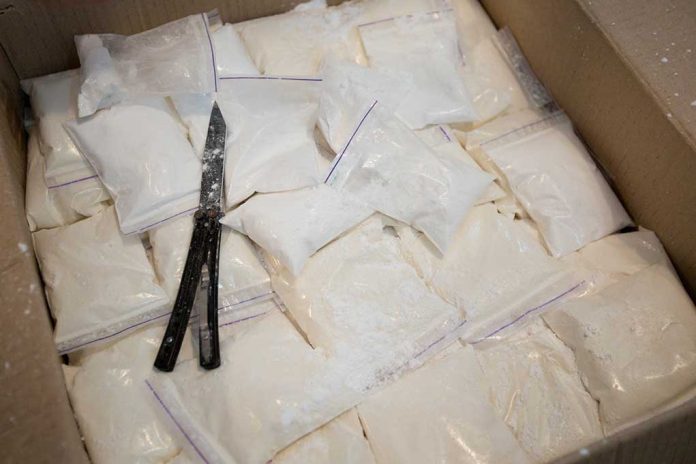
A former British flight attendant faces 25 years in a Sri Lankan prison after being caught with 100 pounds of a deadly synthetic drug made from human bones, valued at $3.3 million.
Key Takeaways
- Charlotte May Lee, 21, was arrested at Bandaranaike Airport in Sri Lanka with approximately 100 pounds of ‘Kush’, a synthetic drug containing human bones, valued at $3.3 million
- The seizure represents the largest marijuana-related drug bust in the history of Colombo’s Bandaranaike Airport
- Lee claims innocence, stating the drugs were planted in her luggage while in Bangkok, and has suggested she knows who is responsible
- ‘Kush’ is a deadly synthetic drug that has caused thousands of deaths in West Africa and contains a dangerous mixture of substances including fentanyl, tramadol, formaldehyde, and possibly human remains
- Sri Lankan authorities noted an increase in drug trafficking from Bangkok, with another passenger arrested in a different country around the same time
British National Faces Severe Consequences in International Drug Trafficking Case
Charlotte May Lee, a 21-year-old former British flight attendant, has been arrested in Sri Lanka for allegedly smuggling 100 pounds of ‘Kush’, a deadly synthetic drug. This shocking case has gained international attention not only for the significant quantity of drugs involved but also for the disturbing nature of the substance itself, which reportedly contains human bones among its ingredients. Lee was apprehended at Bandaranaike Airport in Sri Lanka with drugs valued at approximately $3.3 million, making this the largest marijuana-related seizure in the airport’s history.
The young woman was working in Thailand and had traveled to Sri Lanka while waiting for her visa renewal when authorities detained her. Lee adamantly denies knowledge of the drugs, claiming they were planted in her luggage without her consent. “I had never seen them [the drugs] before. I didn’t expect it all when they pulled me over at the airport. I thought it was going to be filled with all my stuff,” said Lee. When confronted with the evidence, she responded, “They must have planted it then,” and later claimed, “I know who did it.”
Deadly ‘Kush’ Drug Ravaging Communities
The substance found in Lee’s possession is not ordinary cannabis but a particularly dangerous synthetic drug known as ‘Kush’. This lethal combination contains cannabis, fentanyl, tramadol, formaldehyde, and most disturbingly, possibly human remains. The drug has wreaked havoc throughout West Africa, causing thousands of deaths and prompting the presidents of Sierra Leone and Liberia to declare national emergencies. Chemical testing has revealed that ‘Kush’ contains nitazenes, an extremely potent synthetic opioid, along with synthetic cannabinoids.
“Another passenger who had left Bangkok airport, almost at the same time, was arrested in another country. We arrested this lady [Lee] based on profiling,” said a Sri Lanka customs officer.
The international nature of this drug’s supply chain is concerning to law enforcement agencies worldwide. The ingredients for ‘Kush’ are reportedly imported from multiple countries including China, the Netherlands, and possibly the United Kingdom, utilizing various transportation methods. What was once a centralized operation has now become more fragmented, with smaller groups establishing their own manufacturing and distribution networks, making it increasingly difficult for authorities to track and contain.
Lee’s Defense and Growing Concerns About Drug Transit Routes
According to Lee’s account, she left her bags unattended in a hotel room in Bangkok and failed to check them before her flight to Sri Lanka. This crucial oversight, if true, may have provided an opportunity for someone to plant the illegal substances in her luggage. Sri Lankan police have noted a concerning pattern, reporting an increase in drug trafficking from Bangkok. The timing of Lee’s arrest coincided with another passenger from Bangkok being detained in a different country, suggesting a potential organized smuggling operation using unsuspecting travelers as mules.
This case highlights the growing sophistication of international drug trafficking networks and the extreme vulnerabilities in global transit systems. The use of human remains in drug production represents a disturbing new development in the illicit drug trade, showing the lengths to which traffickers will go to create addictive and profitable substances. Lee’s predicament serves as a stark reminder of the severe penalties faced by those caught in international drug smuggling operations, whether willing participants or not, with her potentially facing up to 25 years in Sri Lankan prison if convicted.





